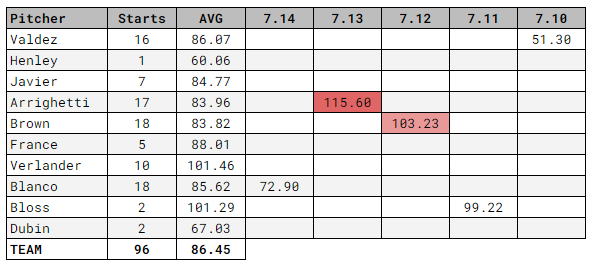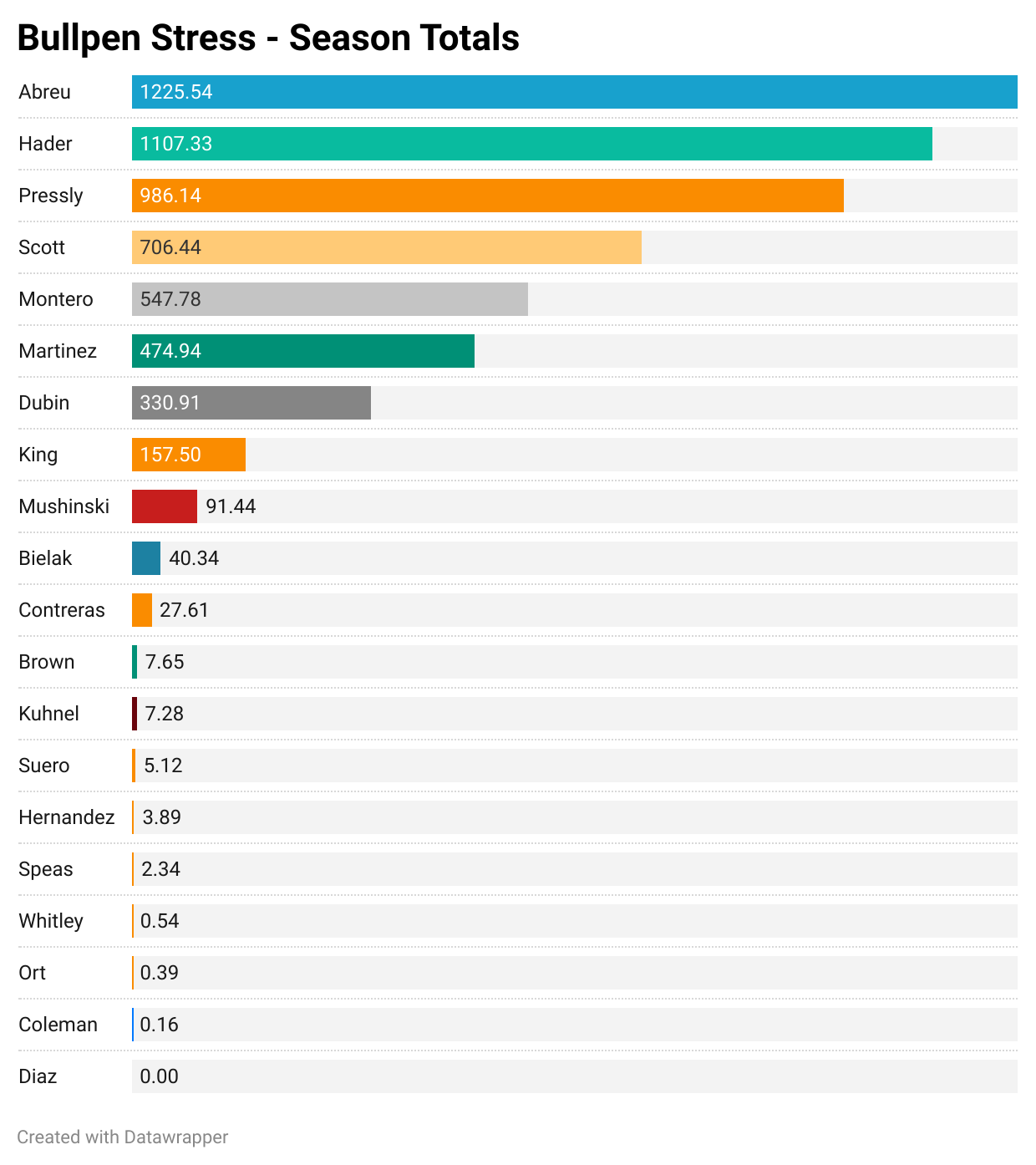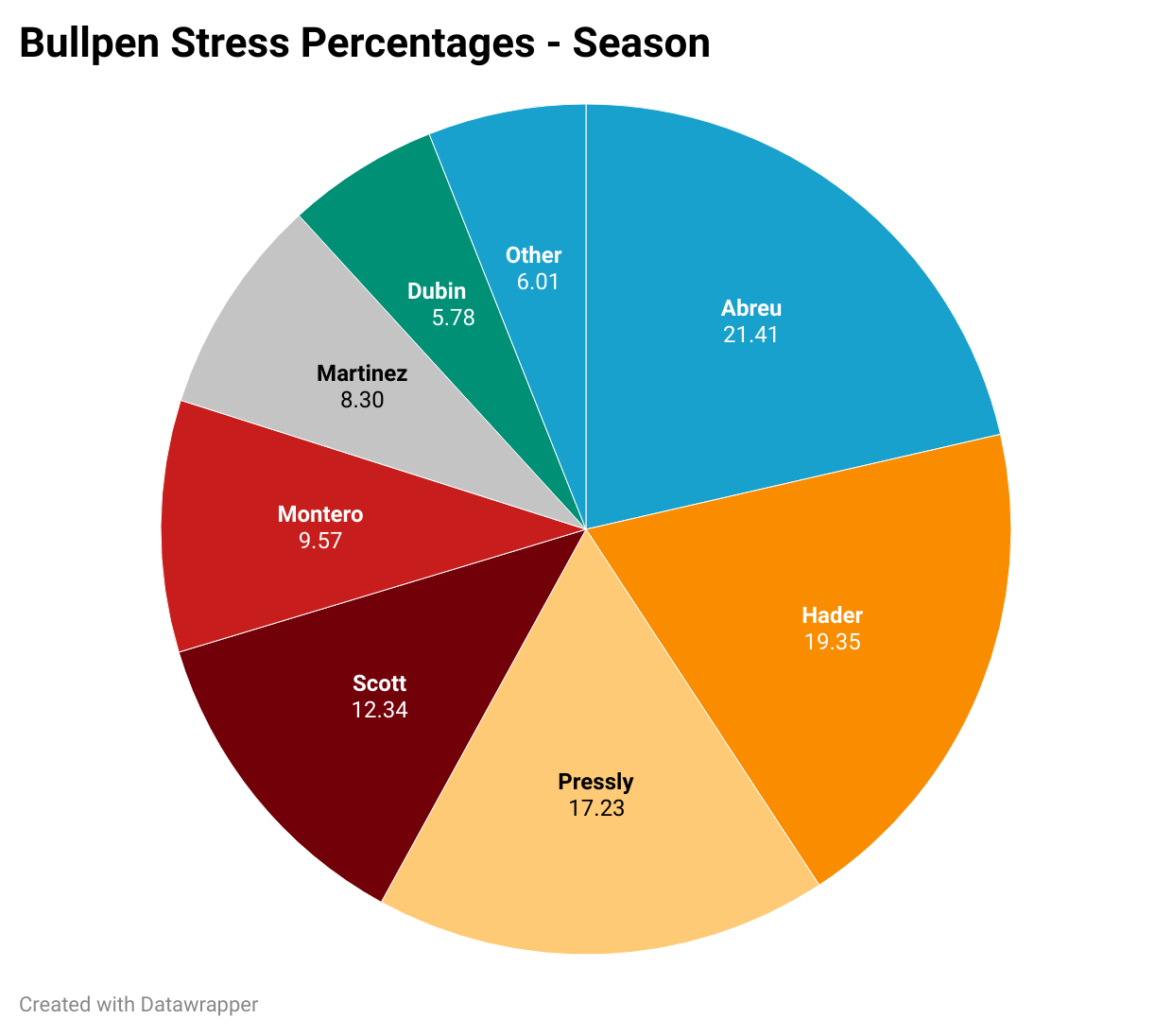Updated Projections - 96 of 162 Games
Let the "Second Half" Begin
Be sure to check out our new pages that are updated daily:
Astros Expected Wins | MLB Projected Standings | MLB Power Rankings | MLB Luck Rankings | Journal
EDITOR’S NOTE:
I’ll be traveling this weekend, so there will be no stat updates this weekend. Regular stat updates should return on Monday (or Tuesday).
Composition of Projections:
2024 Actuals: 59.3% Preseason Projections: 40.7%
The Astros are 50-46, in 2nd place in the American League West, 1.0 game behind the Seattle Mariners.
Fangraphs projects an 86-76 finish, 1st place in the AL West, gives the Astros a 46.3% chance of winning the Division and a 57.8% chance of making the playoffs.
Season Projections
*Having Altuve and Alvarez projected at 140+ games is a big deal.
*Tucker still projects to 31 home runs and Astros have survived without him, but obviously need him down stretch/postseason.
*Bregman has recovered for the most part as I had him at .262, 22 HR, 88 RBI preseason.
*Jake has been an inconsistent surprise in first half, and is batting .242. I’m not sure we should expect more than .250 tops, but his defense has been spectacular.
*It’s crazy that Cesar Salazar has played in only 9 games. His clutch moments make it feel like he’s played more than he has.
*Singleton has been serviceable (102 wRC+) with good defense (his flips to pitchers are A++), but what stands out are the walks he draws. He walks at a percentage higher than Yordan and only Tucker walks more.
*As I’ve pointed out, concerns about stress being put on Brown, Arrighetti, Verlander and Bloss.
Three young guys and an old guy. Not one in their prime, ready for a long, tough slog.
*Blanco has quite literally saved the season for the starters, but he’s already at 109 innings, with his most ever coming last season at 125.1 between Sugar Land and Houston. It is a concern, but less so, because his are generally lower stress starts.
*In the bullpen, the concern is for Abreu as far as usage goes. Not necessarily the number of games, but the way he has pitched involves lots of pitches and runners on, which leads to more stressful pitches. He has had more stress than anyone out of bullpen, including Pressly and Hader.
I need to investigate more, but often he (or whoever 7th inning guy is that day) will face a more stressful situation than the closer. Some of that, of course, is of his own doing, but that doesn’t negate the fact it’s a reality.
*Scott has been outstanding and perhaps a season-saver. His peripheral numbers are generally good, too: Top 4% in exit velo, top 1% in xSLG, top 3% in wOBA, top 6% in HardHit%. His BABIP is low (.198), so some regression may occur, but overall, incredibly well done.
Stress Index
I like this index in combination with innings pitched, because not every inning is the same.
That said, it’s far from perfect, but it gives you a general idea of who is having stressful starts, especially when you see guys over 105 or so (still developing the heat map aspect).
This is why I added the chart that shows you how often starters go over 100.
The 115 for Arrighetti should be a huge red flag, especially for a young starter.
The Home Run Project
OVER | UNDER
Under: 55 Over: 38 Push: 3
Under: 57.3% Over: 39.6% Push: 3.1%
Streak: 2 Under
If you want information on Umpires Scorecards please visit umpscorecards.com.
Projected Standings | Expected Wins | Luck
Through games of 7.14.34
Luck Rankings
Teams at top are “luckiest”, teams at bottom are “unluckiest”.
Astros are 25th in the Luck Rankings, implying there is still some upside in their W/L record ahead.
The Astros are 7-17 in one-run games.
The number below is the percentage of a team’s winning percentage that can be attributed to “luck”, either positive (green) or negative (red).
Example: At one point the Astros win % was .439 and my numbers say they “should” have been at .493, a difference of .054.
.054/.439 = 12.3% (rounded), which was the Astros luck rating, which was negative in this example.
In general, you expect the teams at bottom to regress positively (towards 0.00) and teams at top to regress negatively (to 0.00).
Other Stats/Information
Quality Starts
Across the league teams win close to 70% of games where their team’s starter throws a quality start.
It is closer to 80% if your pitcher has a quality start and the other team’s pitcher does not throw a quality start.
Simply put, it’s indicative of “giving your team a chance”.
Rolling 30-Day Batting
Rolling 30-Day Arms
MLB Power Rankings
On a scale where 100.00 = 81 wins. In other words, a power number of 110.00 means you would be expected to win 110% of the “average team” (81 wins) which equals 89 games.
These rankings consider runs scored, runs given up AND wins and losses.
50.00 = 40.50 wins
75.00 = 60.75 wins
100.00 = 81.00 wins
125.00 = 101.25 wins
Thank you for reading.




















